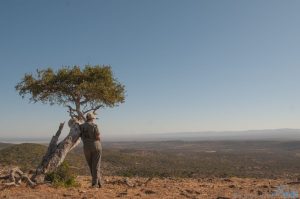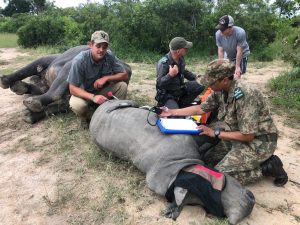
In our latest instalment, we spoke with Tusk Award winner, Cathy Dreyer, to see how her work has developed since 2016.
How has your work developed since winning your award?
So much has changed since winning the Tusk Award in 2016. At the time I was working in the Eastern Cape at Great Fish River Nature Reserve, focused on conservation and law enforcement for the reserve’s Key 1 rhino population. I left in 2017 to take up a position as the Black Rhino Security, Surveillance and Monitoring Coordinator in Kruger National Park and worked on this project for two and a half years.
I returned to the Eastern Cape in 2019 where I became the Conservation Manager for Addo Elephant National Park – an incredibly challenging and rewarding position which introduced me to aspects of Marine Conservation which I have never before been involved in.
 In May 2021 I was offered the position of Head Ranger for Ranger Services in Kruger National Park and have been in this challenging and exciting role since then. My career and work have significantly expanded and developed since winning the award. Part of this is due to the exposure I received after winning the Tusk Award and the connections I made with conservationists from all over the world.
In May 2021 I was offered the position of Head Ranger for Ranger Services in Kruger National Park and have been in this challenging and exciting role since then. My career and work have significantly expanded and developed since winning the award. Part of this is due to the exposure I received after winning the Tusk Award and the connections I made with conservationists from all over the world.
How did winning your award impact your work on the ground?
The grant that I received as a result of winning the award could immediately be directed to projects on the ground that directly involved black rhino conservation and law enforcement. It is also important to note that the award could not have been possible without the support, dedication and commitment of all the rangers and conservationists that I have had the privilege of working with. Winning the award was a testament to that and, I hope, an inspiration to everyone whose work was acknowledged.
Winning the award cast a spotlight on the onslaught on rhino as a result of the growing illegal market for their horns, and has assisted in opening doors that have led to funding opportunities and collaborative work with other conservationists.
How has the landscape for conservation changed since winning your award? What new challenges are you facing?
The ongoing illegal poaching of black and white rhino, driven by organised crime syndicates, remains an ever-present and constant threat, not only to the species but to the rangers responsible for their protection. Rangers risk their lives on a daily basis in order to protect the biodiversity and cultural heritage of Kruger National Park, making significant personal sacrifices in doing so.
The biggest challenges we currently face are largely related to the pandemic. Covid has led to an almost 70% reduction in our operating budgets and continues to be our biggest challenge. The Kruger National Park receives an annual 20% grant from government and is thus responsible for generating 80% of its operating costs. This has led to a number of vacancies which we are not able to fill, as well as reduced budget for operations costs such as vehicles, overtime, standby-allowances etc. The prolonged pandemic has also had a significant impact on the morale of rangers. Lack of budget means no team building exercises, little opportunity for rangers to get together or meet and the loss of colleagues and loved ones due to Covid.
 Internal corruption remains a major challenge – organised crime syndicates target rangers for information and assistance with poaching rhino. Attracted by the allure of money, we have sadly had a number of rangers and employees from other departments become involved in rhino poaching. This has significantly impacted on trust and loyalty amongst rangers. Creating incentives, rewards and career paths for rangers is important to ensure that they remain motivated, loyal and feel appreciated.
Internal corruption remains a major challenge – organised crime syndicates target rangers for information and assistance with poaching rhino. Attracted by the allure of money, we have sadly had a number of rangers and employees from other departments become involved in rhino poaching. This has significantly impacted on trust and loyalty amongst rangers. Creating incentives, rewards and career paths for rangers is important to ensure that they remain motivated, loyal and feel appreciated.
What is it that you love about rhino and what are the major threats facing the species today?
It is an incredible experience and privilege to have worked closely with so many black rhino. I have learnt that each and every one is unique and has their own likes, dislikes and personalities. Rhino have taught me many things:
- It’s okay to have a thick skin.
- Don’t worry too much about the labels people assign to you – there is nothing white or black about rhino, they are all rather grey in colour!
- You can be both fierce and gentle when needed. One only needs to develop a bond with a black rhino to quickly learn this!
The biggest threat facing rhino today is sadly us, humans.
What have been your major successes since winning your award?
Becoming the first female Conservation Manager in Addo Elephant National Parks and later the first female Head Ranger in Kruger National Park have been two major successes and highpoints in my career since winning the award.
